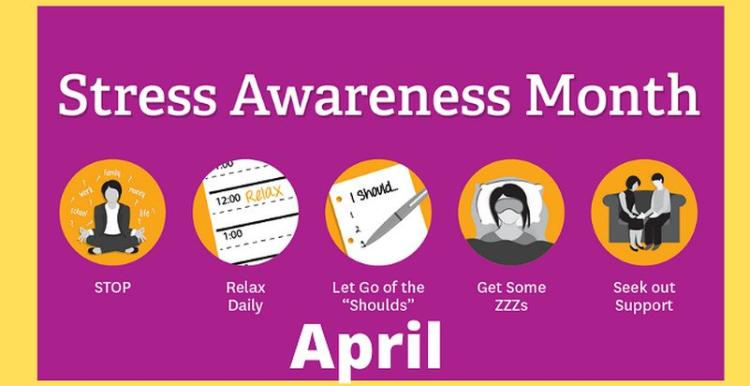Stress Awareness Month 2024
The Stress Management Society, explain how even the smallest steps taken each day towards self-care and stress reduction can mean significant improvements in mental health over time.

- In the UK, 79% of adults experience stress at least once a month, with 74% feeling overwhelmed or unable to cope at some point in the past year.
- 52% of all workers are now battling burnout, marking a 9% increase since before the pandemic.
- Only 13% of employees feel comfortable discussing their mental health openly at work.
- Stress can lead to bad habits such as an increase in drinking alcohol, eating unhealthily, or smoking, which further exacerbate the negative effects of stress.
Dealing with stress:
Stress is something everyone feels at times, especially when dealing with change or life challenges, such as money worries, work issues or relationship problems.
A little stress can be a good thing, as it helps us to get things done or focus on something that needs our attention. How we manage stress can make a big difference to our mental wellbeing, and the first step to managing it is to know how it affects us and why.
Try positive thinking
Positive thinking can help with stress relief, so take time to think about the good things in your life. Each day, list 3 things you're thankful for, however small.
Try self-help techniques
Our short videos and practical guides to cognitive behavioural therapy (CBT) can help you deal with stress by working through problems in new ways and building resilience. Try our self-help CBT techniques
Talk to someone
Trusted friends, family and colleagues, or contacting a helpline, can help us when we are struggling. Check out our video on social connection.
Split up big tasks
You might feel less stressed if you can take practical steps, such as breaking a task down into easier, more manageable chunks. And give yourself credit when you finish a task.
Be more active
Being active regularly can help you to burn off nervous energy, so it could be a way for you to deal with stress. Exercise might also help you manage or reduce stress. Try our Better Health: Home workout videos.
Prioritise sleep
During sleep we can process information, consolidate memories, and undergo a number of maintenance processes that help us to function during the daytime. Sleep is crucial to the health of individuals.
Plan ahead
Planning ahead for upcoming stressful days or events – creating a to-do list, planning your journey and listing things you need to take – can really help to relieve stress.
Mental Health Support
If you need support with your feelings of stress you can:
- find Free Resources - The Stress Management Society
- make a Your mind plan (www.nhs.uk)
- speak to your GP or NHS 111.
- Find an NHS talking therapies services - NHS (www.nhs.uk)
- Visit the Halton Mental Health Information Point for local and national mental health support information: Mental Health Information Point


